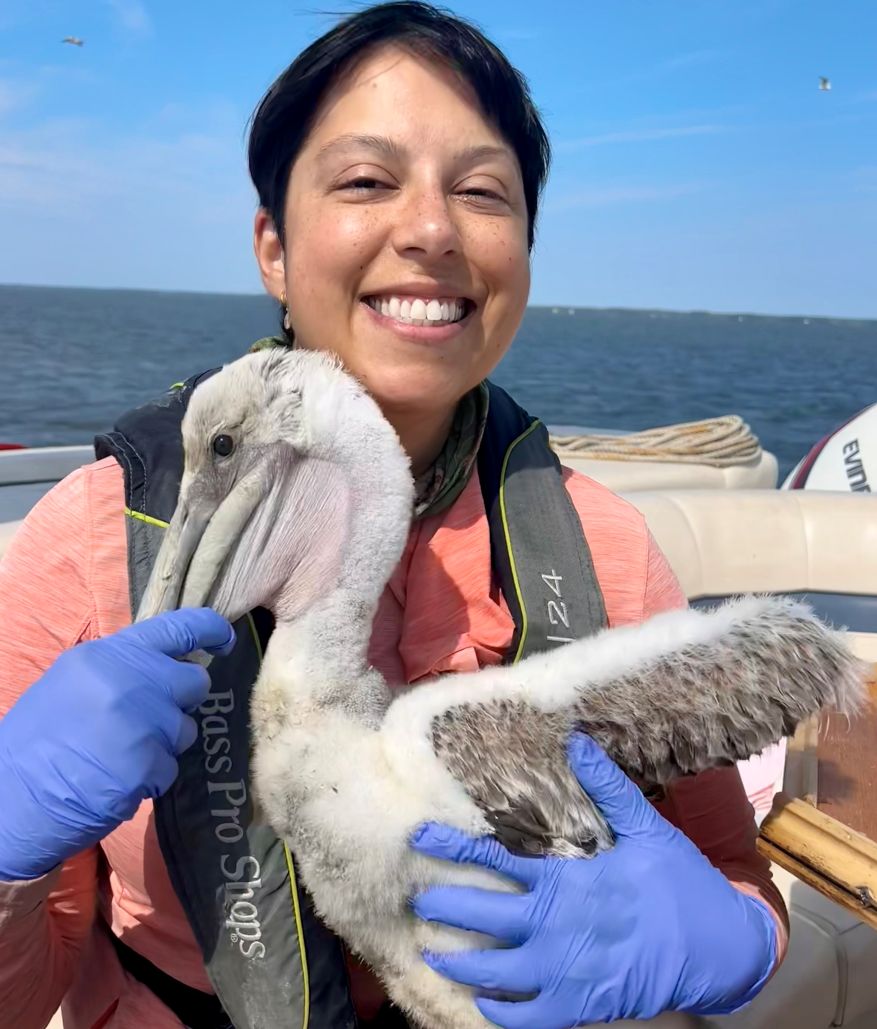- Assistant Professor of Wildlife Disease Ecology
- Department of Natural Resources Science
- Email: j_harvey@uri.edu
- Office Location: Coastal Institute, 115-A
- Website
- Google Scholar
Biography
Johanna Harvey is an Assistant Professor of Wildlife Disease Ecology at the University of Rhode Island. Dr. Harvey is a broadly trained evolutionary ecologist with a focus on wildlife disease ecology, immunogenetics, and conservation and management science. Dr. Harvey received her Ph.D. in Wildlife and Fisheries Sciences from Texas A&M University, completed a postdoctoral position at the University of Connecticut and a Gerstner Scholar Fellowship at the American Museum of Natural History, followed by a position as a jointly appointed postdoctoral researcher at the University of Maryland and USGS Eastern Ecological Science Center within the Disease, Decision, Analysis, and Research Group. Dr. Harvey’s research has focused on emergent diseases such as highly pathogenic avian influenza, emergent and co-evolved pathogens including avian malaria parasites and vampire flies
Research
The Harvey lab makes use of multiple methods including but not limited to transcriptomics, immunology, phylogenetics. In light of the dramatic declines in bird populations, their work aims to address the overlooked role of wildlife disease, with a particular focus on vector-borne and emerging viral pathogens. Understanding the compounding effects of anthropogenic stressors including disease, urbanization, contaminants, and climate change, is crucial for informing effective conservation and management decisions. Members of the lab focus on understand the impacts of disease and anthropogenic pressures on wildlife and understand their ability to adapt to these stressors. The Harvey lab’s research program seeks to apply science to conservation problems, working with decision makers and leveraging partnerships with governmental and local agencies, non-governmental groups, and stakeholders to inform conservation management across scales. Specifically, using multidisciplinary approaches to better understand adaption and susceptibility of populations to wildlife diseases with the use of immunological, transcriptomic, and population level studies. Lab research aims are to 1) Understand the evolutionary mechanisms involved in immune response (immunogenetics) in the wild is a fundamental need in disease ecology and evolution. When a novel pathogen is introduced to wildlife, populations may either not have innate immunity and exhibit high virulence infections which can result in mortality, or they may develop an adaptive immune response that results in tolerance or resistance mechanisms to future infections. Determining the pathways of host immune response in natural infections is a pivotal step to understanding the evolution of host populations to emerging disease; and 2) Identify emerging disease drivers of wildlife decline and inform conservation management. The immunological and pathogenic response mechanisms of the current H5N1 circulating avian influenza are not understood for diverse wild bird and mammal species currently being impacted. When considering the sensitivity of species, further increases in transmission and mortality events could have major implications for species such as colonially nesting and raptor populations, which have been disproportionately affected, including populations and species of already heightened conservation concern. My research seeks to wholistically address the study of wildlife disease ecology and provide research which may be applied to inform disease management and improve conservation and species management for sensitive species. The collaborative aspects of this emerging disease research allow me to work with wildlife managers and decision scientists to implement actionable science focused research using decision analytical tools such as structured decision making.
Education
Ph.D., Texas A&M University, Wildlife and Fisheries Sciences, 2018
B.S., Texas A&M University, Wildlife Ecology & Conservation, 2010
Selected Publications
• Harvey, J.A. et al. Decision tools to assess loss during marine bird mortality events. In prep. To be submitted to Ornithological Applications.
• Harvey, J.A., Gonnerman, M., Yin, S., Kent, C., Cullen, J., Sullivan, J.D., Dain, J.B., Hill, N.J., Mullinax, J.M., and D.J. Prosser, Feathers and Flu: Meta-analysis of Avian Influenza Host Dynamics and Future Data Needs to Prioritize Wildlife Conservation. In prep. Invited Wildlife Monographs.
• Harvey, J.A., et al. 2023. The Changing Dynamics of Highly Pathogenic Avian Influenza H5N1: Next Steps for Science and Management in North America. Biological Conservation. 282: 110041. (doi.org/10.1016/j.biocon.2023.110041)
• Harvey, J.A. et al. 2023. Effect of RNA preservation methods on RNA quantity and quality of field collected avian whole blood. Avian Biology Research. (doi.org/10.1177/17581559231169179)
• Harvey, J.A. et al. 2021. Urban living can increase the reproductive success of Darwin’s finches. Ecology and Evolution.11: 5038-5048 (doi.org/10.1002/ece3.7360)
• Harvey, J.A. et al. 2019. Host associations and climate influence avian haemosporidian distributions in Benin. International Journal of Parasitology 49: 27-36. (doi.org/10.1016/j.ijpara.2018.07.004)

